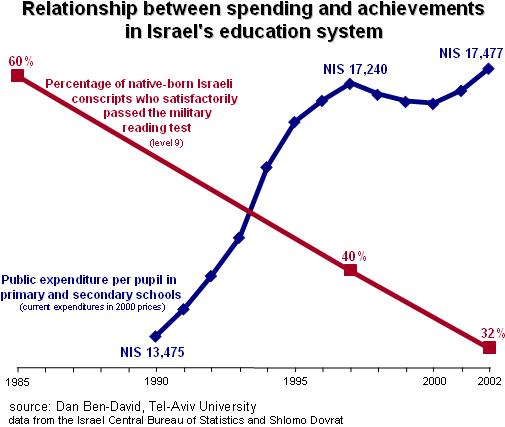|
PDF file
published
in Haaretz on September 2, 2007.
A Lesson in Spin
by Dan Ben-David Each Fall, the beginning of the school
year is accompanied by articles and interviews in the media which point at the
budget cuts of recent years as the source of the country’s educational freefall. According to the spin approach to rewriting
history, everything began with a report presented in 2000 before Prime Minister
Ehud Barak and his cabinet by an academic team – of which I was a member –
headed by Professor Haim Ben-Shahar. We
presented Israel’s socio-economic big picture, its problematic long-run
trajectories, their sources, their bleak implications for the country’s future,
and pointed out the fundamental policy changes that needed to be made. If there was one central overarching
theme in the report, it was that the trends that had developed here since the 1970s
were not a result of too little public spending but rather from the national
priorities underlying how the money was spent. One of the areas of focus was
education. We found that during the 1990s,
educational expenditure per pupil in Israel was high in comparison with other
western countries (after correcting for differences in living standards across
countries) while the knowledge level of the children of Israel in math and
science (as reflected in international exams) was very low in comparison with
those same developed countries – with all that this implies regarding the
future ability of Israeli children to successfully adapt to a modern and
competitive economy. Under the
circumstances, we recommended that the government of Israel not cut its
educational spending to a level reflecting the poor education being provided
here. Instead, we suggested that it
implement a comprehensive reform of the education system that will raise its
output to a level justifying the large budgets. A short while after we appeared before
Barak’s cabinet, I published some additional findings on Israel’s very high
placement in the international exams during the 1960s, a fact that indicates a
sharp deterioration in the education level over the subsequent decades. But why let such difficult facts get in the
way of an otherwise intuitive story when it is possible to rewrite history and
claim that the decline was an outcome of
the budget cuts? Data on education spending published
by Israel’s Central Bureau of Statistics (CBS) goes all the way back to the mid-1970s. They show that between 1975 and the early 1990s,
the ratio of education spending to national income was relatively stable. OECD data indicate that this level of
spending was very high in comparison with the other countries in the world. When the focus narrows down to public
expenditure per primary and secondary school students only, the graph shows
that the Rabin government increased education expenditures by a huge amount
during the 1990s – but in a diffuse manner and not as part of a systemic reform. Hence, the level of education
continued to fall, not just in relation with other countries but also in
relation with ourselves. During those
years of large and increasing education budgets, the reading comprehension
level among native-born military conscripts fell by almost 50%. In an age in which spin replaces facts
as an educational value, who spends time trying to cure the illness when it is
possible to throw money at it and instill a false sense of hope that the
symptoms will disappear on their own? Leading
those who thrive on denial as an education policy is the education minister, who
has no qualms in boasting about her success in receiving a huge budget increase
– at the expense of welfare and health – of 5 billion shekels as an alternative
for a comprehensive reform of her ministry. Today’s education minister, Yuli Tamir,
was the absorption minister during that April 2000 cabinet meeting in which we
showed the ministers how a similar (to today’s) budget increase during the 1990s
did not prevent the precipitous educational decline – as is evident in the
graph. All of which suggests an Israeli
corollary to the famous adage about leading a horse to water: it is possible to
lead our cabinet ministers to money, but it is extremely difficult to make them
use it wisely. comments
to:
danib@post.tau.ac.il
|
